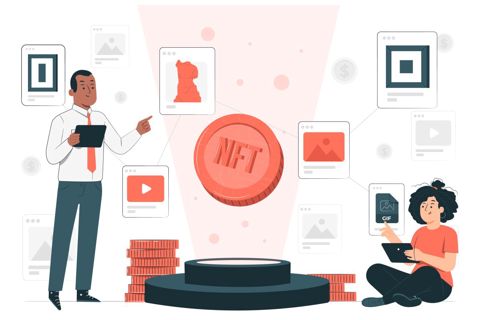
Introduction
In the rapidly expanding world of Non-Fungible Tokens (NFTs), NFT marketplaces play a pivotal role in connecting artists, collectors, and enthusiasts. These online platforms provide a space for buying, selling, and trading NFTs, facilitating transactions and creating an ecosystem where unique digital assets can thrive. In this article, we will explore the business model of NFT marketplaces, shedding light on their key components and the role of NFT marketplace development companies in shaping this emerging industry.
Understanding NFT Marketplaces
NFT Marketplaces: The Gateway to Digital Assets
NFT marketplaces serve as the primary entry point for participants looking to engage with NFTs. These platforms offer a wide range of digital assets, including artwork, collectibles, virtual real estate, and more. NFT marketplaces provide a user-friendly interface that allows artists to showcase their creations and collectors to explore and acquire unique pieces. They act as the intermediary, facilitating transactions and ensuring a secure environment for users.
The Role of NFT Marketplace Development Companies
NFT marketplace development companies play a crucial role in building and maintaining these platforms. They possess the expertise in blockchain technology, smart contract development, and user interface design necessary to create intuitive and seamless experiences. These companies collaborate with artists, collectors, and blockchain developers to bring NFT marketplaces to life. They are responsible for the technical infrastructure, security features, and overall functionality of the platform.
The Business Model of NFT Marketplaces
Revenue Streams for NFT Marketplaces
NFT marketplaces generate revenue through various channels. Let's explore some of the common revenue streams:
Transaction Fees: NFT marketplaces typically charge a fee on each transaction that occurs on their platform. This fee, usually a percentage of the transaction value, helps cover the operational costs and generates revenue for the marketplace.
Listing Fees: Some marketplaces may charge artists or creators a fee to list their NFTs on the platform. This fee can vary based on factors such as the prominence of the marketplace and the visibility provided to the listing.
Premium Services: NFT marketplaces may offer premium services to artists and collectors for an additional fee. These services can include enhanced visibility, featured listings, or marketing support to promote NFTs and attract a larger audience.
Secondary Sales Royalties: Some NFT marketplaces implement secondary sales royalties, where a percentage of the resale value is automatically distributed to the original creator or rights holder. This provides ongoing revenue for artists, incentivizing them to list their NFTs on the marketplace.
Community Building and Engagement
Successful NFT marketplaces focus on building a vibrant and engaged community. They foster an environment where artists can connect with collectors and enthusiasts, creating a sense of belonging and shared passion. Marketplaces often include social features such as comments, likes, and follows, allowing users to interact with each other and build relationships. This community-centric approach helps drive user retention, increases platform activity, and attracts new participants.
Curated vs. Open Marketplaces
NFT marketplaces can follow different models when it comes to curating the content available on their platform. Some marketplaces adopt a curated approach, where a team of experts selects and approves the NFTs to ensure quality and authenticity. Curated marketplaces provide a more controlled environment and can be attractive to collectors seeking curated collections. On the other hand, open marketplaces allow anyone to list NFTs, providing a wider variety of options but requiring users to conduct their own due diligence.
Conclusion
NFT marketplaces have emerged as the driving force behind the rapidly growing NFT industry. With their user-friendly interfaces, secure transaction mechanisms, and vibrant communities, these platforms provide a space for artists, collectors, and enthusiasts to explore, buy, and sell unique digital assets. NFT marketplace development company can play a crucial role in shaping this ecosystem, bringing together technology, creativity, and commerce. As the NFT landscape continues to evolve, NFT marketplaces are poised to play an increasingly significant role, unlocking new possibilities for creators and collectors alike.
FAQs
1. Are NFT marketplaces limited to specific blockchain networks?
While some NFT marketplaces are built on specific blockchain networks like Ethereum, others support multiple blockchain networks or are built on their own proprietary blockchain. The choice of blockchain depends on factors such as scalability, security, and community preferences.
2. Can artists sell their NFTs on multiple marketplaces simultaneously?
Yes, artists have the flexibility to list their NFTs on multiple marketplaces simultaneously. This allows them to reach a broader audience and increase the chances of their NFTs being discovered and sold.
3. How can NFT marketplaces ensure the authenticity of digital assets?
NFT marketplaces implement various measures to ensure the authenticity of digital assets. These can include verifying the identity of artists, conducting due diligence on the artwork or content, and leveraging blockchain technology to establish a transparent and immutable recordof ownership.
4. What are the primary challenges faced by NFT marketplaces?
NFT marketplaces face challenges such as scalability issues during peak trading periods, ensuring adequate security measures to protect user data and assets, and addressing regulatory concerns surrounding the ownership and transfer of digital assets.
5. Can NFT marketplaces be accessed through mobile devices?
Yes, many NFT marketplaces offer mobile applications or mobile-responsive websites, allowing users to access and engage with the platform using their smartphones or tablets. This provides convenience and flexibility for users to explore and trade NFTs on the go.
0 comments
Be the first to comment!
This post is waiting for your feedback.
Share your thoughts and join the conversation.
